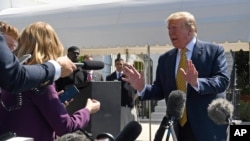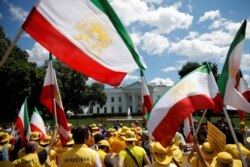VOA’s national security correspondent Jeff Seldin contributed to this report.
President Donald Trump said Saturday he planned “major” new sanctions against Iran to take effect Monday, without providing details.
Huddling with administration officials at the presidential retreat Camp David, Trump announced the move in a tweet.
He spoke with reporters at the White House before leaving for Camp David, at one point saying as soon as Tehran agreed to renounce nuclear weapons, “I’m going to be their best friend.”
Trump’s tone was much softer Saturday after a week of intense actions between the U.S. and Iran.
Fears of a confrontation
Concern about a potential armed confrontation between the U.S. and Iran has been growing since U.S. officials recently blamed Tehran for mine attacks on two oil tankers in the Strait of Hormuz, allegations Tehran denies, and Iran’s downing of an unmanned U.S. drone this past week.
On Friday, Trump said that he had canceled late Thursday a retaliatory strike against several Iranian targets.
He tweeted that the United States was “cocked & loaded to retaliate last night on 3 different sights when I asked, how many will die. 150 people, sir, was the answer from a General. 10 minutes before the strike I stopped it,” Trump tweeted, saying the action would have been disproportionate.
World leaders call for calm
World powers have called for calm after the incidents.
German Chancellor Angela Merkel on Saturday urged for a political resolution of the crisis. “That is what we are working on,” she told Reuters.
On Sunday, Britain’s Middle East minister, Andrew Murrison, will travel to Tehran for talks with Iranian officials.
Britain’s Foreign Office said Murrison would call for “urgent de-escalation in the region.” He will also discuss Iran’s threat to cease complying with the nuclear deal that the United States pulled out of last year.
James Phillips, a senior researcher at the conservative Washington-based Heritage Foundation, said he believes the immediate risk of a U.S.-Iran conflict has passed.
“It’s probably over as far as the incident goes with the shoot down of the drone. But, I think if there are further provocations, the president will respond in a strong and effective manner,” he said.
Phillips also said he does not expect Tehran to accept U.S. calls for negotiations while Trump continues a “maximum pressure campaign” of sanctions on Iran.
“I doubt that Tehran will be serious until it sees who wins the next presidential election,” he said.
The U.S. announced this week it was authorizing another 1,000 troops, including a Patriot missile battery and additional manned and unmanned reconnaissance aircraft, to bolster defenses at U.S. positions in Iraq and Syria.






